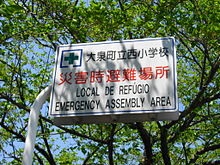|
|
| |
|
|
| |
|
|
|
|
| |
 |
| Sign in Japanese,
Portuguese, and English in Oizumi, Japan, which
has a large lusophone community due to return
immigration of Japanese Brazilians. |
Portuguese
Portuguese (Portuguese: português) is a Romance
language. It came from Galician-Portuguese, which was
first spoken in Northwestern Iberia. It then spread
south and split. During the colonial era, Portuguese was
also spread to Brazil and other parts of the world.
Where it is spoken
The Portuguese language is the third-most spoken western
language (after English and Spanish). There are about
240 million native speakers, including the people of
Portugal, Brazil, and Cape Verde (Cabo Verde). It is
also the official language of Guinea-Bissau, Cape Verde,
Angola, Mozambique (Moçambique), and São Tomé and
Príncipe (São Tomé e Príncipe), which have Portuguese as
the lingua franca, but native languages are also spoken.
It is also an official language in East Timor and Macau. |
|
|
Also, some enclaves in Asia, such as Goa and Daman and
Diu, in India; Flores, Indonesia; and Malacca, Malaysia,
have Portuguese-speakers, and it is a minority language
in Venezuela, Canada, Uruguay, Namibia, and the United
States. |
|
Vocabulary
Portuguese and English have words that mean the same and
are similar as well. The words came from the same
languages (usually Latin, Greek or French).
Some English words come from Portuguese, such as tank (tanque),
cacao (cacau), marmalade (marmelada from marmelo
"quince"), caramel, molasses, mosquito, cobra, breeze (brisa),
albino, coconut, zebra, pagoda, Mandarin, buccaneer,
tapioca and commando.
The Portuguese word parentes is similar to the English
word "parents", but it means "relatives", and the
Portuguese word to mean "parents" is pais. |
|
Different versions
Portuguese is the official language of all countries of
the CPLP (Comunidade dos países de língua portuguesa,
"Community of Portuguese Language Countries"). The
Portuguese-speaking countries have more than 240 million
people across the world. The CPLP was formed in 1996
with seven countries: Portugal, Brazil, Angola, Cape
Verde, Guinea-Bissau, Mozambique, and São Tomé and
Príncipe. East Timor joined in 2002.
The CPLP nations speak Portuguese with different
accents. In some regions of Brazil (the country has 81%
of the world's Portuguese-speakers), tu'("you" but used
only to family and close friends) is not used as much as
in Portugal. Also, regional slang can be found in
different areas. The Portuguese Orthographic Agreement
of 1990 (Acordo Ortográfico de 1990) tries to get rid of
some of the differences in spelling. |
|
|
 Kiddle: Portuguese Kiddle: Portuguese
Wikipedia: Portuguese |
|
|
|
|
|
|
|
|
|
|
|
|
|
|
|
|
Search Fun Easy English |
|
|
|
|
|
|
|
|
|
|
|
|
|
|
|
About
Contact
Copyright
Resources
Site Map |